#Worst Ex Ever documentary review
Explore tagged Tumblr posts
Text
Worst Ex Ever Review: True Crime Meets Toxic Love
Netflix's "Worst Ex Ever" is where true crime meets troubled romance. This docuseries unravels real-life tales of partners who went from lovers to lethal threats.
Sneha Jaiswal (Twitter | Instagram) There’s a hilariously viral video of a woman giving a speech at her sister’s birthday, where she asks the bride and groom to look into each other’s eyes. As they do so, emotionally bracing for something sweet, the woman says, “Just know that the person you’re looking at right now… is statistically more likely to murder you.” Everyone bursts into loud laughter,…
#Benjamin Obadiah Foster case#documentary#domestic violence#Reviews#True crime documentary#Worst Ex Ever docu series review#Worst Ex Ever documentary review#Worst Ex Ever Review#Worst Ex Ever season one review
0 notes
Text
Review of Worst Ex Ever on Netflix
Worst Ex Ever is an unsettling yet necessary exploration of the dark side of relationships, with each episode in this anthology-style series profiling different cases of abuse, manipulation, and violence by former partners. What makes this series stand out is the diversity in the types of criminal behavior it covers, ranging from extreme physical violence to psychological abuse and fraud. The…
#abuse prevention#crime series#criminal behavior#documentary review#domestic abuse#intimate partner violence#netflix#Netflix documentary#relationship trauma#relationship violence#resilience#survivor stories#toxic relationships#true crime#Worst Ex Ever
1 note
·
View note
Video
youtube
WORST EX EVER Netflix Documentary Series Review (2024)
0 notes
Link
When she was 18, Taylor Swift wrote a song called “Fifteen.” “Back then I swore I was going to marry him someday, but I realized some bigger dreams of mine,” she sang, sounding more like a wizened great-grandmother than a rising senior.
“Fifteen” is evocative, if a little sanitized: Nimble mandolin strums mimic the nervous-excited butterflies of the first day of high school, as Swift sings of wide-eyed hope that “one of those senior boys will wink at you and say, ‘You know I haven’t seen you around before.’”
There was a certain emotional truth to the lyrics — do several years’ age difference ever seem more consequential than when you’re a teenager? — but some older listeners were skeptical. “You applaud her skill,” wrote a critic for the Guardian in a mixed review of Swift’s second album, “Fearless,” “while feeling slightly unsettled by the thought of a teenager pontificating away like Yoda.”
Swift, now 31, sings, “When you are young they assume you know nothing,” on “Folklore,” an LP that is both compositionally mature and braided throughout with references to the specific, oft-denigrated wisdom of teenagers. By the end of that song, “Cardigan,” the narrator has excavated such a heap of florid but emotionally lucid memories that she must conclude, with the force of a sudden revelation, “I knew everything when I was young.”
Though it’s not as flashy a topic as exes, fame or A-list celebrity feuds, age has long been a recurring theme in Swift’s work. A numerology enthusiast with a particular attachment to 13, Swift has also released a handful of songs whose titles refer to specific ages: “Seven,” “Fifteen,” and, of course, “22,” the chatty “Red” hit on which she summed up that particular junction of emerging adulthood as feeling “happy, free, confused and lonely at the same time.” Like her contemporary Adele, Swift seems to enjoy time-stamping her music, sometimes presenting it like a public-facing scrapbook that will always remind her what it felt like to be a certain age — even if, with their millions of fans and armfuls of Grammys, neither of these women is exactly typical.
Swift’s critics have often seemed even more hyper attuned to her age. Perhaps because precocity played such a role in her story from the beginning — at 14, she became the youngest artist to sign a publishing deal with Sony/ATV; at 20, she became the youngest to win the album of the year Grammy — many listeners have been fascinated with how her evolution into adulthood has, or hasn’t, played out in her songs. People comb Swift’s lyrics for allusions to sex, alcohol and profanity as meticulously as MPAA representatives do a borderline-PG movie. Particular attention was paid to her 2017 album “Reputation” and its several mentions of drunkenness and dive bars — even though Swift was 27 when it came out.
The relative puritanism of Swift’s music up until “Reputation” did feel like an intentional decision: Unlike the female pop stars who broadcast their “loss of innocence” as a sudden and irrevocable transformation, Swift seemed acutely conscious that she did not want to repel younger listeners — or lose the approval of their parents. At best, it felt like an acceptance of her status as a role model; at worst, it had the whiff of a marketing strategy.
But the mounting obsession with whether Swift was “acting her age” also reflected a larger societal double standard. Famous or not, women face much more intense scrutiny around age, whether it’s those constant cultural reminders of the biological clock’s supposed ticking or the imperative that women of all ages stay “fresh-faced” or risk their own obsolescence. (“People say I’m controversial,” Madonna said in 2016. “But I think the most controversial thing I have ever done is to stick around.”) And while girlish youth and ingenuity are rewarded in some contexts, they’re also easily dismissed as silly and frivolous as soon as that girl strays too close to the sun — as Swift has experienced time and again.
Despite having once been a teenage girl myself (unlike a lot of music critics), I confess that I am not completely free of these internalized biases. I was initially dismissive of “Miss Americana and the Heartbreak Prince,” a song that appeared on Swift’s 2019 album “Lover.” The first few times I heard it, I wondered what a grown woman on the cusp of 30 was doing still writing about homecoming queens and teenage gossip.
But over time, I’ve come to appreciate the song and its dark vision, which acknowledges cruelty, depression and the threat of sexual violence (“Boys will be boys then, where are the wise men?”) more directly than any of the songs Swift wrote when she was an actual teenager. The senior boys in this song are not the sort who wink and say to freshman girls wholesome things like, “Haven’t seen you around before” — which, unfortunately, makes them feel more authentic. Even the title “Miss Americana” alludes to a larger world outside the high school walls, and the greater systemic forces that keep such patterns repeating well into adulthood.
“Miss Americana and the Heartbreak Prince” now feels like a precursor to some of the richest songs on “Folklore,” which finds Swift returning once again to her school days with the keen, selectively observant eye of an adult. Consider “Seven,” an impressionistic recreation of her perspective at that age. The second verse, charmingly, plays like a first-grader’s breathless sequence of unguarded observations:
“And I’ve been meaning to tell you, I think your house is haunted, your dad is always mad and that must be why/And I think you should come live with me and we can be pirates, then you won’t have to cry.”
But “Seven” is not cutesy so much as poignant, because of the tensions that result when Swift’s adult perspective interjects. “Please, picture me in the trees, before I learned civility,” she sings in a yearning soprano, prompting the listener to wonder what sorts of feral pleasure she — and all of us — have exchanged for the supposed “civility” of adulthood.
Quite a few songs on “Evermore,” Swift’s second release of 2020, also toggle between past and present, conscious of what is lost and gained by the passage of time. The playful “Long Story Short” passes a note to Swift’s younger self (“Past me, I wanna tell you not to get lost in these petty things”), while “Dorothea,” like “Seven,” revisits a fevered childhood friendship from the cool perspective of adulthood.
Most striking is the bonus track “Right Where You Left Me,” a twangy tale of a “girl who got frozen” (“Time went on for everybody else, she won’t know it/She’s still 23, inside her fantasy”). That language echoes something Swift admits in the 2020 Netflix documentary “Miss Americana”: “There’s this thing people say about celebrities, that they’re frozen at the age they got famous. And that’s kind of what happened to me. I had a lot of growing up to do just trying to catch up to 29.”
But Swift’s recent songs, at their best, understand that “growing up” isn’t always a linear progression in the direction of something more valuable. Take the “Folklore” songs “Cardigan” and “Betty,” which use an interconnected set of characters to chronicle teenage drama and celebrate the heightened emotional knowledge of youth. “I’m only 17, I don’t know anything, but I know I miss you,” Swift sings in the voice of James, a high schooler who broke Betty’s heart and has shown up on her doorstep to ask forgiveness. Maybe that is a melodramatic thing to do; maybe it is the sort of thing adults could stand to do more often. Swift’s music helps us to remember that growing up doesn’t automatically mean growing wiser — it can just as easily mean compromise, self-denial and growing numb to emotions we once felt with bracing intensity.
In a gesture to regain control of her songs, Swift is currently rerecording her first six albums (her master recordings were recently sold by Scooter Braun’s Ithaca Holdings to the investment firm Shamrock Capital). Last month she released a note-for-note update of her early hit “Love Story,” and has promised to release an entire new-old version of “Fearless (Taylor’s Version)” later this year. It has been amusing to think of Swift going back and inhabiting the voice of her teenage self: On the face of it, “Fifteen” is particularly surreal to imagine her singing as an adult.
In another way, though, “Fifteen” — with its distant reflections on the youthful folly of expectations — makes more sense and carries more emotional weight being sung by a 30-something than it does an 18-year-old. Perhaps Swift was preparing for such an exercise when she made “Folklore,” an album that shakes off years of scrutiny and finds her reveling in the creative freedom to be as young or as old as she wants to be.
#posting the whole article with my emphasis because i thought this was very interesting#taylor swift
63 notes
·
View notes
Text
‘There’s still a presence out there reminding people not to speak about JFK’s killing’
Oliver Stone is not a fan of “cancel culture”. “Of course I despise it,” the Oscar winning filmmaker says, as if utterly amazed that anyone needs to ask him such a dumb question. “I am sure I’ve been cancelled by some people for all the comments I’ve made…. it’s like a witch hunt. It’s terrible. American censorship in general, because it is a declining, defensive, empire, it (America) has become very sensitive to any criticism. What is going on in the world with YouTube and social media,” he rants. “Twitter is the worst. They’ve banned the ex-President of the United States. It’s shocking!” he says, referring to Donald Trump’s removal from the micro-blogging platform.
It’s a Saturday lunchtime in the restaurant of the Marriott Hotel on the Croisette in Cannes. The American director is in town for the festival premiere this week of his new feature documentary JFK Revisited: Through the Looking Glass, in which he yet again pores over President John F Kennedy’s assassination in November 1963.
“I am a pin cushion for American-Russian peace relations… I had four f***ing vaccines: two Sputniks and two Pfizers,” Stone gestures at his arm. The rival super-powers may remain deeply suspicious of one another, but Stone is loading himself up with potions from both sides of the old Iron Curtain.
He has recently been travelling in Russia (hence the Sputnik jabs) where he has been making a new documentary about how nuclear power can save humanity. He also recently completed a film about Kazakhstan’s former president Nursultan Nazarbayev which – like his interviews with Vladimir Putin – has been roundly ridiculed for its deferential, softly-softly approach toward a figure widely regarded as a ruthless despot.
Dressed in a blue polo shirt, riffing away about the English football team one moment and his favourite movies the next, laughing constantly, the 74-year-old Oscar-winning director of Platoon, Wall Street, Natural Born Killers et al is a far cheerier presence than his reputation as a purveyor of dark conspiracy thrillers might suggest. He is also very outspoken. For all his belligerence, though, Stone isn’t as thick-skinned as you might imagine. I wonder if he was hurt by the scorn that came his way when his feature film JFK was released in 1991.
“I was more of a younger man. It was painful to me,” the director sighs as he remembers being attacked by such admired figures as newscaster Walter Cronkite and Hollywood power broker Jack Valenti for listening to the “hallucinatory bleatings” of former New Orleans DA Jim Garrison when JFK came out. “It was quite shocking actually because I thought the murder was behind us. I did think there was a feeling that 30 years later, we can look at this thing again without getting excited. But I was way wrong.”
Garrison, of course, was the real-life figure portrayed by Kevin Costner in the film; he was the original proponent of the theory that the CIA were involved in the killing of the US president, after his 1966 investigation. Garrison wrote the book On the Trail of the Assassins, on which the movie was partly based.
Even the director’s fiercest detractors will find it hard to dismiss the evidence he has assembled about the JFK assassination in the new documentary. Once I’d seen it and heard him hold forth, I came away thinking that only flat-earthers can possibly still believe that Lee Harvey Oswald shot President Kennedy all on his own. It’s that convincing.
Stone blitzes you with facts and figures about the Kennedy killing and its aftermath. At times, he himself seems to be suffering from information overload. “I am sorry. There are so many people,” he apologises for not immediately remembering the name of Kennedy’s personal physician, George Burkley, who was present both at Parkland Hospital, where Kennedy was first taken, and then at Bethesda, where the autopsy took place. Burkley was strangely reticent when giving evidence to the Warren Commission.
“I think there’s still a presence out there which reminds people not to speak. I’ve heard that in, of all places, Russia,” Stone says. He was startled to discover that the Russians knew all about his new documentary long before it was discussed in the mainstream press. “They said, ‘We heard about it.’ I said, ‘How?’ They said, ‘We have our contacts in the American intelligence business. They are not very happy about it.’”
Stone believes that no US president since Kennedy died has been “able to go up against this militarised sector of our economy”. Even Trump “backed down at the last second” and declined to release all the relevant documents relating to the assassination. “He announced, ‘I’m going to free it up, blah blah blah, big talk, and then a few hours before, he caved to CIA National Security again.”
The veteran filmmaker expresses his frustrations at historians like Robert Caro, author of a huge (and hugely respected) multi-volume biography of President Lyndon Johnson, for ignoring the evidence that has been turned up about the assassination.
“I can’t say [LBJ] was involved in the assassination,” explains Stone, “but it certainly suited him that Kennedy was not there anymore and he covered up by appointing the Warren Commission and doing all the things he did.”
Stone tried to cast Marlon Brando in JFK in the role as the deep throat source Mr X, eventually played by Donald Sutherland.
“I realise now I am grateful that he turned it down because he knew better than I that he would make 20 minutes out of that 14-minute monologue and it wouldn’t have worked.”
Nevertheless, he filled the film with famous faces. He thought that having familiar actors would make it easier for audiences to engage with what was an immensely complicated story.
Getting Stone to stop talking about JFK is like trying to pull a bone from a mastiff’s jaws. To change the subject slightly, I ask if he is still in touch with WikiLeaks founder Julian Assange. He is and is utterly horrified at how Assange is being treated, especially given that Siggi the Hacker, a key witness in the extradition case against Assange, admitted recently that he lied. Stone praises Assange’s partner Stella Morris as “the best wife you could ever have. She really is smart, she’s a lawyer … he has two children. He can’t even touch them or see them. It’s barbaric. It indicates America is declining faster than we know. It is just cutting off dissent.”
The mood lightens when I invite Stone to discuss some of his favourite films. He recently tweeted a list of these, which included Darling starring Julie Christie, Joseph Losey’s Eva starring Stanley Baker and Jeanne Moreau, and Houseboat, a frothy comedy starring Cary Grant and Sophia Loren. “I love films, always have. People don’t know that side of me. I could go on forever.”
Between his darker and more contentious efforts, Stone has made a few genre films himself, for example the underrated thriller U-Turn starring Sean Penn and Jennifer Lopez. He notes, though, that even when he tried a sports movie, he ended up right back in the firing line. The NFL was furious about his 1999 American Football film, Any Given Sunday. “They (the NFL) are arrogant, very rich people who close down any dissent, so I had to change uniforms and names… but they got the point.”
Last year, Stone published the first volume of his autobiography, Chasing the Light, which took him from childhood up to his Oscar triumph with Platoon. It was well received but it didn’t make nearly a big enough splash for his liking. “There was a curtain of silence about that. Maybe it is Covid… it was not reviewed by many people,” he says. “I wish the timing had been better. The publisher was terrible. They didn’t really promote anything. So now I have to start over again if I am going to do a second book, which I would love to do. But I have to find the right publisher.”
The book contains a barbed account of Stone’s experiences as a young screenwriter working in London for British director Alan Parker and producer David Puttnam on Midnight Express. “I wrote about it in the book, so you got my point of view. They were not very friendly people. I gave my criticism of Parker that he had a chip on his shoulder. He was from a poor side of the English. There is this phenomenon you see in England of hating the upper classes until they approve of you.”
No, they didn’t stay in touch. “And Puttnam is a Lord, right? He reminds me of Tony Blair. He is such a weasel.” For once, Stone feels he has overstepped the mark. He doesn’t want to call Puttnam a weasel after all. “Put it this way, Tony Blair is a weasel. I wouldn’t trust Tony Blair. Puttnam is a supporter of Blair. Let’s leave it at that.”
On matters English, he isn’t that keen on soccer either. He watched the semi-final between England and Denmark but had no intention of tuning into the final.
“Soccer is a different kind of game. It’s a different aesthetic. It is constant movement. The United States game allows you to re-group after every play and go into a huddle and so it becomes about strategy. I still enjoy it although people think I am brutal.”
Ask him why he so relishes American Football and he replies that he “grew up with violence in America … we were banging – cowboys and Indians, a lot of killing and that stuff. How do you get away from that? We weren’t playing with dolls.”
Stone’s feelings about the US are deeply ambivalent. He is old enough to remember a time in the late 1940s and early 1950s when “everything in America was golden” and part of him still seems to love the country but his mother was French and he talks about the US as a nation now in near terminal decline.
Perhaps surprisingly, his real political hero isn’t JFK. It’s the former President of France, Charles de Gaulle. “He said no to NATO and he said no to America. He understood the dangers of being a satellite country to America. You have no power in Europe. Don’t kid yourself. The EU is just an artificial body that was amazingly stupid in cutting off Russia and cutting off China too now.”
He doesn’t much like Boris Johnson either. “Boris, listen. He’d simply throw you in jail in a second.” He rails against the English for holding Assange in Belmarsh prison.
When he is not on a crusade or unravelling a conspiracy, Stone relaxes through Buddhist meditation. “Moderation in all things,” the man who came up with the phrase “greed is right, greed works” says with no evident sense of irony. He enjoys hanging out with his friends. “I have a nice life. I’m lucky,” he says before quickly adding, “I wish I had been more honoured and respected in my lifetime, but it seems that I took a course that is in conflict with the American Empire.”
Stone’s films have had relatively few strong female characters. Ask if he welcomes the #MeToo movement and the challenging of old gender norms and he gives a typically contrary answer. “It cuts both ways, though. There are reasons for patriarchy through the centuries,” he says. “Tribes tend to have a strong leader. You need strong leaders, but I do see the feminine impulse as being important, especially when situations become too militant. The feminine impulse, I’m talking about the maternal impulse not the Hillary Clinton/Margaret Thatcher version of feminism. They’re men. They’re not women,” he says. “I don’t want women in politics who want to be men. If a woman is a woman, she should be a woman and bring her maternalism. It’s a leavening influence.”
The director deplores the rush to judge historical figures about past misdeeds from a contemporary point of view. “I am conservative in that way… don’t expect to rejudge the entire society based on your new values.”
He met with Harvey Weinstein in Cannes a few years ago to discuss a potential Guantanamo Bay TV series. “At that point, maybe he knew he was on the ropes; he was delightfully charming and humble.” The project was scuppered by the scandal that that engulfed the former Miramax boss, who is now behind bars as a convicted sex offender. Stone’s gripes with Weinstein are less to do with his sexual offences than with the way that he attacked films like Born on the Fourth of July and Saving Private Ryan to boost his own movies.
“The press loved him [Weinstein]. Don’t forget, they loved him in the 1990s,” he says, remembering the disingenuous way in which Weinstein portrayed himself as the underdog taking on the big, bad Hollywood system.
“I think he robbed Cruise of the Oscar, frankly,” Stone huffs at the intensive Weinstein lobbying which saw Daniel Day-Lewis win the Academy Award for Best for My Left Foot, denying Tom Cruise for Born on the Fourth of July in the process.
Stone acknowledges his status in Hollywood has diminished. “All that’s gone. The people have changed,” he says of the days when the studios doted on him and his films were regularly awards contenders. Now, he’ll often finance his work out of Europe. He is developing a new feature film (he won’t say what it is). “Never say die, never say it’s over,” he says of his career.
Stone is based in Los Angeles and also has “a place in New York”. During the pandemic, he still managed to travel to Russia to make his nuclear power/clean energy documentary. “I got my shots over there because the EU is so f***ing stupid,” he says of the of the Europeans’ refusal to recognise the Sputnik vaccine. “It’s ridiculous, part of the political madness of this time.”
Now, he is putting all his energy into his new documentary about nuclear power. He waves away the idea that the Chernobyl and Fukushima disasters show what can go wrong – they were accidents.
“Accidents you learn from. If there were not a few crashes, how would you fly?” he says. It’s a line that somehow seems to express his entire philosophy of life.
-Geoffrey Macnab interviews Oliver Stone, The Independent, Jul 15 2021 [x]
#oliver stone#jfk#jfk: through the looking glass#the independent#julian assange#boris johnson#david puttnam#harvey weinstein#born on the fourth of july#covid19#vaccine#chasing the light#cannes film festival
2 notes
·
View notes
Text
Entertainment Weekly, January
Just a reminder, you can always ask for something to be scanned in :)
Cover: Entertainer of the Year -- Awkwafina (1 of 6 covers)

Page 1: Contents, Taika Waititi

Page 2: Soundbites
Page 5: Editor’s Note, all of the covers

Page 6: The Must List -- Margot Robbie on Bombshell
Page 8: Little Women, Will This Oscar Movie Make Me Cry? Marriage Story, Little Women, A Beautiful Day in the Neighborhood, Ford v Ferrari, Pain and Glory, Jojo Rabbit
Page 10: Tom Hooper: In Defense of Cats
Page 11: Jagged Little Pill
Page 12: National Lampoon Radio Hour, The Witcher, Q+A with Henry Cavill
Page 13: You
Page 14: Followers by Megan Angelo, Clemency, Harry Styles is “the 21st century’s most intriguing mythmaking pop star”
Page 15: Nick Offerman’s Must List
Page 17: First Look -- Noah Centineo and Lana Condor in To All the Boys: P.S. I Still Love You
Page 20: Keanu Reeves and Alex Winter in Bill & Ted Face the Music
Page 21: John Turturro and Winona Ryder in The Plot Against America
Page 22: John David Washington and Robert Pattinson in Tenet
Page 23: Natalie Dormer in Penny Dreadful: City of Angels
Page 29: Entertainers of the Year
Page 30: Awkwafina
Page 33: Phoebe Waller-Bridge by Brett Gelman
Page 34: Renee Zellweger
Page 37: Ta-Nehisi Coates by Jacqueline Woodson, Billie Eilish
Page 40: Regina King
Page 43: Eddie Murphy by Wesley Snipes, Margaret Atwood
Page 44: Taika Waititi
Page 47: Taylor Swift by Brendon Urie
Page 49: Lil Nas X by Ryan Tedder, Brad Pitt by Quentin Tarantino
Page 50: Lizzo
Page 53: Keanu Reeves
Page 54: The cast of Succession -- Jeremy Strong, Kieran Culkin, Sarah Snook
Page 57: Sterling K. Brown
Page 58: Best & Worst of 2019
Page 60: 10 Best Films
Page 61: Trust Exercise by Susan Choi -- the year’s most divisive literary ending, Great Performances -- Diane Guerrero
Page 62: How Slave Play shook Broadway’s status quo
Page 63: The Night That Changed TV -- Game of Thrones’ The Long Night
Page 64: 10 Best Shows
Page 65: The Literary Sequel Ranking
Page 66: Hits and misses of series finales -- Jane the Virgin, Crazy Ex-Girlfriend, Veep, Game of Thrones
Page 67: 3 Video Games We Couldn’t Put Down -- Death Stranding, Sekiro: Shadows Die Twice, Untitled Goose Game
Page 68: Great Performances -- Carmen Maria Machado
Page 69: 10 Best Albums
Page 70: Great Performances -- Jharrel Jerome, 3 Podcasts We Couldn’t Turn Down
Page 71: Six episodes that had us glued to the screen
Page 72: How Oklahoma! made Broadway history, the book-club bonanza
Page 74: Actors gave performances that moved, surprised, and enthralled us -- Leonardo DiCaprio, Zhao Shuzhen, Joe Pesci, Adam Driver, Da’Vine Joy Randolph, Jennifer Lopez, Adam Sandler
Page 76: 10 Best Books
Page 77: The honest aging of the male movie star, the 7 songs you’ll be playing forever
Page 78: Who will (and should) win Grammy gold
Page 80: The 2020 Grammys Secret Ballot
Page 83: News & Reviews -- Aerosmith feeling sweet emotion over their Musicares award, Q+A -- Tanya Tucker
Page 84: Q+A -- Sam Mendes
Page 85: 1917
Page 86: Robert Downey Jr. in Dolittle
Page 87: Bombshell, Awardist -- Lupita Nyong’o
Page 88: Paul Walter Hauser in Richard Jewell, Just Mercy
Page 89: Why 1939 was the best movie year ever
Page 90: Director Richard Stanley on his comeback
Page 93: Location -- Los Angeles for Booksmart
Page 94: TV -- Rob Lowe
Page 95: Remembering BoJack
Page 96: The Outsider
Page 97: You
Page 99: What to Watch
Page 104: Music -- Linda Ronstadt and Johnny Cash documentaries
Page 106: Books -- Winter’s chilliest thrillers
Page 107: Writer to Watch -- Catherine Steadman
Page 108: Kiley Reid
Page 110: Books of my Life -- Isabel Allende
Page 112: The Bullseye
#tabloid#awkwafina#Regina King#lizzo#taika waititi#renee zellweger#succession#harry styles#keanu#keanu reeves#alex winter#bill and ted face the music#john david washington#robert pattinson#rob pattinson#tenet#tenet movie
1 note
·
View note
Text
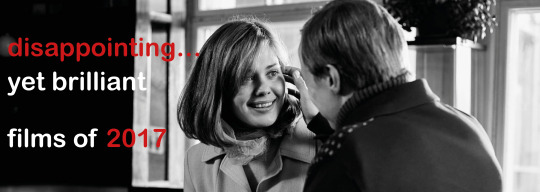
This is a list of my favourite films of the year. That sounds like a simple statement, but in some quarters the long-running arguments about what is and isn’t a film got very heated in 2017. Even the year bit of that can get very messy.
But for at least this one last time, I’m keeping things simple: these are the films I enjoyed most out of the ones that were released in UK cinemas in 2017.*
There were plenty of films I didn’t see: some I wanted to but didn’t get round to – Colossal is the one that stands out. Others I just wasn’t drawn to – Detroit, Dunkirk (give money to Christopher Nolan and he’ll only keep making movies) and the critically adored Call Me By Your Name (the super-annoying title probably didn’t help).
There were lots of movies I did see and like, though, and that’s what we’re here to talk about…
*This decision was made simpler because I didn’t love any of the films that Netflix streamed without even giving a token cinema release, which included Noah Baumbach’s The Meyerowitz Stories (New And Selected) and Sundance favourite I Don’t Feel At Home In This World Anymore. The best of the bunch was The Incredible Jessica James.
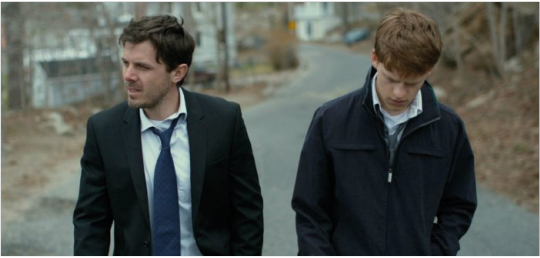
1. Manchester By The Sea
Back in October 2016, I wrote: ‘If a better film is released in the UK in 2017, I’ll be very impressed.’ Well, I have been impressed by the excellent movies below on this list, but none of them beat Manchester By The Sea as far as I’m concerned. In outline, it sounds like nothing special: a story of some grim stuff happening to a fairly ordinary family, in particular a bloke who likes to pick fights in bars and his teenage nephew. But writer-director Kenneth Lonergan turns the ingredients for a predictable drama into something very special, not least by lacing this grief-laden story with lots of (appropriately) funny moments.
Full review here

2. The Handmaiden
A lot of the films on this list are fairly light on plot, so if you want a movie with scheming, counter-scheming and deception, not to mention pretty costumes, sex, cherry blossoms, perviness (its 18 certificate is richly earned) plus differing Korean views of their Japanese occupiers, this is the one. It’s directed by Park Chan-wook, best known for Old Boy, and loosely based on Sarah Waters’ Victorian-set melodrama Fingersmith, which turns out to be perfectly suited to Korea in the 1930s.
Full review here
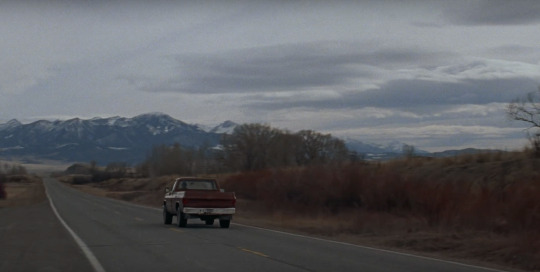
3. Certain Women
Resolutely low-key collection of three slightly overlapping short stories set in wintery Montana. It’s a character piece, with Laura Dern, Michelle Williams and (the excellent, previously little-known) Lily Gladstone leading each segment. Director Kelly Reichardt knows exactly who these women are, and how the place they live shapes them. It seems modest at first, but it stuck in my mind long after flashier films had faded away.
Full review here
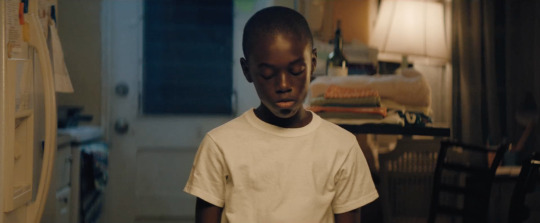
4. Moonlight
So much of what I read about Moonlight made it sound so much less interesting than it is. Around awards time, you could have easily formed the impression it was a heart-tugging issue movie, not helped by the campaign to get Naomi Harris an Oscar (‘Look! Pretty woman getting grubby to play junkie skank!’)**
What makes it a remarkable film – and it is a remarkable film – are the extraordinary cinematography and the telling of the story via often fragmentary scenes, and how little is explained, at least until the much more conventional, even theatrical (and thus slightly disappointing) final segment. Great moviemaking is about the how, not the what.
Full review here
**The classic awards-season tendency to grade performances by perceived difficulty points led to people talking about Harris rather than the way better Janelle Monae.

5. The Happiest Day In The Life Of Olli Mäki
Lovely, bittersweet based-on-real-life tale of Mäki, a small man who was Finnish boxing’s big hope in the early 1960s. It’s not really a boxing film, more a story about two decent young people trying to work out what they want. Which probably doesn’t sound like the most gripping core of a film, but it works. My favourite Finnish film of the year, narrowly shading…
Full review here
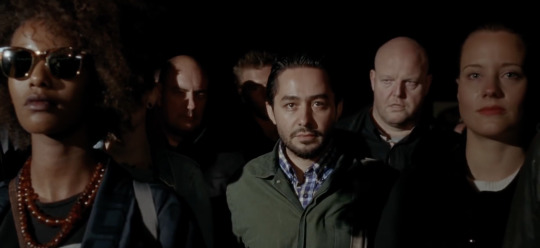
6. The Other Side Of Hope
Why should social realism be the only way of looking at problems like the refugee crisis? Aki Kaurismäki brings his taste for dramatic lighting, deadpan acting and vintage rock’n’roll to this story of a young Syrian braving bureaucracy and street racism in Helsinki. Less funny than most Kaurismäki films, but I found it very moving.
Full review here
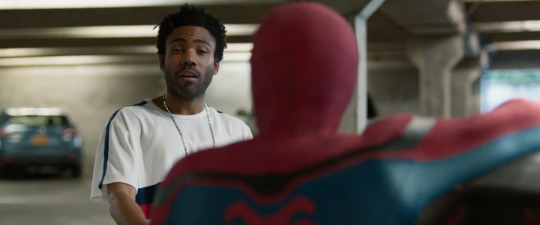
7. Spider-Man: Homecoming
I’ve had enough of super heroes on screen – Marvel’s The Defenders on Netflix was the last straw. I’m voting for a moratorium on them*** and gangsters. So it took a lot to persuade me to see yet another Spider-Man reboot. ‘Don’t think of it as an action movie, think of it as a high-school comedy,’ said my friend Jess, and she was right. It’s nimble and funny and doesn’t take itself too seriously – the best surprise of the year.
Full review here
***I’m totally prepared to believe that Thor: Ragnarok is enjoyable in a bonkers, proggy kind of way, but I’m not risking it. Too many people insisted Captain America: Civil War was good.

8. The Death Of Stalin
After dealing with the (by comparison small) monsters of the Blair era in The Thick Of It, Armando Iannucci turns to the worst – by at least one measure – men in history: Beria, Molotov and Uncle Joe himself.
I don’t think by portraying the farcical nature of the days after Stalin’s death the film is disrespectful to all those who died. I think humour has always been part of how we confront the horror.
The Death Of Stalin has the best ensemble cast of the year – Jeffrey Tambor as Malenkov, Steve Buscemi as Khrushchev, Jason Isaacs giving the performance of his career as Marshal Zhukov, and – best of all – Simon Russell Beale as Beria. And, crucially, it’s definitely a film, not a bit of TV that has snuck on to the big screen.

9. Daphne
Essentially, a classic US indie movie transplanted from Brooklyn to Walworth. The title character is a pretentious and self-centred 30-year-old failing to get her life together – she’s just like women I used to meet at parties in south London 10 or 15 years ago. That could make for a dull film, of course, but the writing, the feel for the place and Emily Beecham as Daphne make it funny and involving.
Full review here
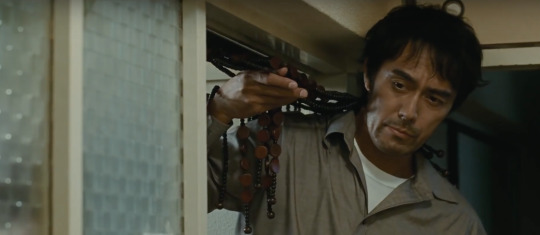
10. After The Storm
Once promising writer with a gambling problem becomes low-rent PI and uses his new skills to keep tabs on his ex. If you think you can imagine how this film goes from that description, you’re probably miles from Hirokazu Kore-eda’s typically patient, generous-spirited and occasionally funny family drama.
Full review here

11. A Ghost Story
Or that one with the white-sheet-with-eye-holes phantom. A Ghost Story is definitely a film you either buy into or you don’t, an austere tale about grief and loss. I did, and found it sad and moving and pleasingly different.
Full review here

12. Neruda
It’s a playful movie about a playful title character – the Chilean poet and dilettante politician during his dramatic time on the run from the authorities – but Neruda has a melancholy underlying mood that rises to the surface as the film goes on. It’s a smart, complex and entertaining film.
Full review here
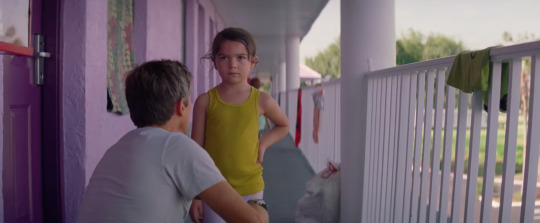
13. The Florida Project
A group of small kids living in a low-rent long-stay motel have adventures and misbehave a bit. And that’s mostly it, with a few dips into the struggles of the mother of one of the kids, plus a sense of the endless patience and generosity of spirit of the motel manager (Willem Dafoe, the sole big name in the cast). What’s impressive is the way Sean Baker maintains a tone that manages to dodge both ‘look at what grindingly terrible lives poor folk lead’ and being a whimsical adorable-kids-running-wild picture. It does drag a little about three quarters of the way in, but the ending pulls it back.

14. La La Land
First it was an instant masterpiece that was going to change the game, then it was a deflating bubble as the haters managed to shout louder than the lovers. So which take on this nostalgia-soaked showbiz musical do I agree with? Well, there are problems with the film – mostly to do with director Damien Chazelle’s continuing attempts to foist his rotten ideology of music on the rest of us via his movies – but I think the people who were swooning were closer to the truth than the raspberry blowers.
Full review here
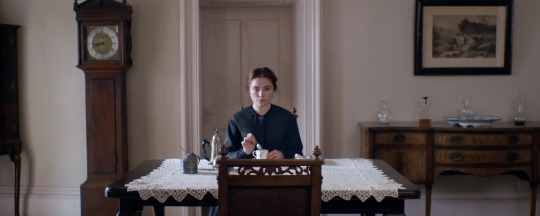
15. Lady Macbeth
Bracingly bleak and at times hard to watch, this is very much in the anti-heritage industry counter-tradition of British period dramas. It’s about the rebellion of a young woman against a grim arranged marriage in Victorian Yorkshire, a struggle that makes strange and grim turns. Unpleasant, but an impressive and memorable piece of filmmaking.
Full review here

16. Blade Of The Immortal
‘Blood-drenched’ would be an understatement when it comes to this gleefully violent supernatural samurai tale in which an almost unkillable ronin is hired by a young girl to revenge her father’s death. If it doesn’t match up to veteran director Takashi Miike’s kinetic 2010 masterpiece 13 Assassins, Blade Of The Immortal is still full of staggering set pieces. Not for the squeamish.
Full review here
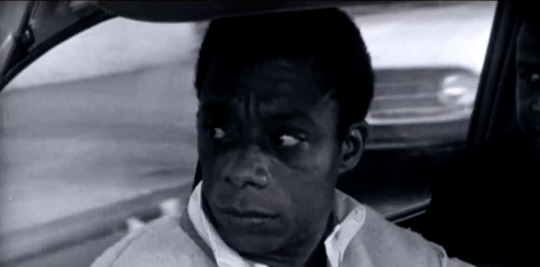
17. I Am Not Your Negro
In a variant on the title of this blog, I’d describe this documentary as kind of unsatisfactory yet powerful. It’s got a curious premise: it’s an ‘adaptation’ of a book that was only vaguely started: James Baldwin’s look at the meaning of the lives and deaths of Medgar Evers, Malcolm X and Martin Luther King.
The result is a slightly rambling wander through what Baldwin wrote and said about black lives in America. The clips of Baldwin on TV and at the Oxford Union are electrifying. The chunks of his writing are beautifully read by Samuel L Jackson in a warm, wise deep oak-aged voice than sounds precisely nothing like either Samuel L Jackson or James Baldwin.
Dropped in around the place are news stills from the last couple of years by way of saying, ‘Yes, Obama made it to the presidency, but otherwise things are still fucked.’ That’s a bit clumsy and crude. What makes the film is Baldwin himself – a great writer (I’m still annoyed that someone nicked my copy of The Fire Next Time in 1991) but also a figure who confounds our condescension of past times: here was a black gay man who was an international public intellectual in the 1960s.
Best old films I saw on the big screen

Scarface
Not every rapper’s favourite movie – this is the terrific 1932 original, a ripped-from-the-headlines account of the rise of a ruthless Chicago gangster that’s as electrifyingly urgent as current organised-crime dramas are weary.
Full review here
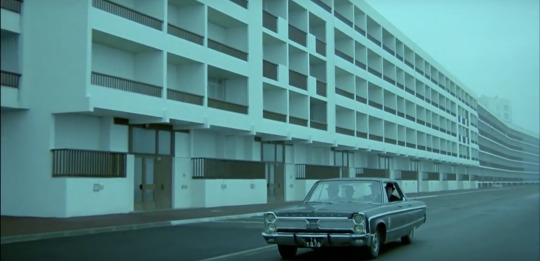
Un Flic
Jean-Pierre Melville, whose career stretched from the 1940s to ’70s, made some of my favourite films ever – Bob Le Flambeur, Le Samurai, Army Of The Shadows – and the BFI showed all of them in a splendid full retrospective this autumn. Of the ones I’d never seen before, my favourite was Un Flic, his last film, a bleak, minimalist film in which a laconic, sadistic cop (Alain Delon) slowly gets on the trail of a heist crew. Moody, stylised and very cool.
Full review here
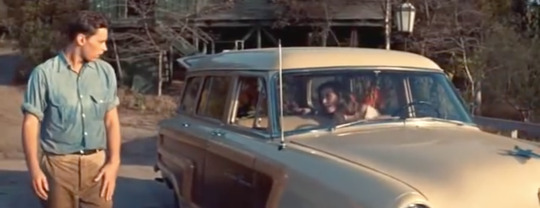
The Cobweb
Over the top, and unashamedly so, Vincente Minnelli’s undervalued mid-’50s melodrama is set in a psychiatric clinic, has a great cast and a plot in which the choice of a set of curtains causes all manner of scheming, bitching and betrayal.
Full review here

La Vérité
An uncharacteristically meaty role for Brigitte Bardot is at the centre of this courtroom drama from Henri-Georges Clouzot. BB plays a beatnik girl on trial for murder, but what made her do it and can a patriarchal justice system treat her fairly? I suspect this felt dated when it appeared in nouvelle vague-era Paris, but it seems pretty relevant now.
Full review here

Salesman
Extraordinary documentary about a group of travelling salesman doing their damnedest to flog absurdly overpriced Bibles to low income Catholics in a late 1960s US where the Age of Aquarius most definitely isn’t in effect.
Full review here
And DYB’s films of:
2016
2015
2014
2013
2012
2011
6 notes
·
View notes
Photo
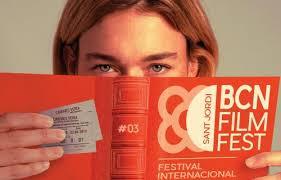
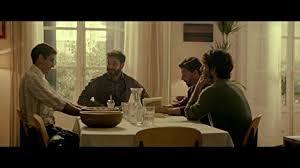
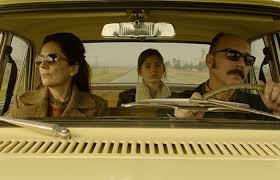
WOKE! Film Reviews
BCN FILM FESTIVAL 2019 (DAY ONE)
by
Lucas Avram Cavazos
The BCN/St. Jordi Film Festival inaugurated its third annual showcase in the beloved Gracia district of BCN on the eve of Saint George’s Day…HappyBelated!… with a swirl of roses and lines of books, cinema lovers and industry milling about despite the rather finicky weather this year. Inaugurating the eight day affair was local director Dani de la Orden’s latest piece Litus, which was simple yet surprisingly effective… See review below. The BCN Film Fest revolves around literary and historically-based films and adaptations, and also works in tandem with EducaCine and acontracorriente films to bring cinephiles, students and history buffs together from all over the world. Below is a quick selection of films from the first day. Without further ado…let’s twawk, shall we?
Litus ###-1/2 Barcelona director Dani de la Orden made his name a few years back with his sentimental rom-com city pieces Barcelona, nit d’estiu and its sequel Barcelona, nit d’hivern with the backing of beloved TV host Andreu Buenafuente. This film however takes a step into a mature fase of what de la Orden is certainly processing, not necessarily in reference to the theme, but this is definitely a more personal take on a group of friend’s worst nightmare. When dear mate and singer Litus commits suicide, months later, his brother Toni (Quim Gutierrez) takes it upon himself to call the core group of friends together for a specific reason. He holds a series of goodbye letters from his brother for each of them and upon their opening, the truth slowly seeps out like honey. The performances by all involved are spot on, and it is hard not to love the soulful longing and sincerity in Belen Cuesta’s eyes or Tu Cara Me Suena winner Miquel Fernandez’s expressions. This may well be the best film of de la Orden’s career so far, but much of that has to do with the real-life concerns that hit all too many of us after whatever certain age. Based on Marta Bachaca’s theatre play of the same name, some things have been tweaked from her original but the exploration of themes like unexplained loss, mortality, love’s labour lost, Peter Pan syndrome and even, oh so charmingly, the wonderful film Peter’s Friends make for a film that stays with you well after you leave the movie theatre…wonderful Spanish cinema.
Rojo ###-1/2 A look-back on a time gone by, this film could easily be based on true events if it’s not already. Imagine rural Argentina, mid-70s during the Triple A drama and coup d’ etat…there is a tense yet agreeable nature to things all around you and the way director Benjamin Naishtat paints the film is curt yet on point, sad yet beguiling. Dr. Claudio Moran (Dario Grandinetti) lives a content and stable life and is a pillar in the community AND a successful attorney. This can go a long way in that day and age…unless surprise murder springs its meddling head. And this is where Rojo really begins. Here at abitterlife, I never give away spoilers (unless truly necessary, read: casi nunca!), so while there is an astounding if languid presence that mopes about this taut drama piece, there is also a wonderful telling of the 70s via the spectacle of the Latin American middle class. The style, music, autos, food and Euro-American melding, that only places like Argentina can often serve up heartily, hearken back to a time that was just starting to touch the essence of a new age dawning. The latest pieces of Argentinian cinema reflecting on its history (think El Angel from last year…exquisite!) have been rather remarkable in their ability to be good thought-provokers. No award winners here, most likely, but gripping in its own subtle way.
Sir ###-1/2 My twin brother Matthew is in love with India…and so is my dear friend Kiki, whose mum lived there for years. As I’ve never been, I can only say that the Hindi take on spirituality, spicy food, cinema, colours and great dance music make me love them…full stop. In dealing with the tensions that can most certainly exist amongst the caste systems of the Indian population of nearly 1.4 billion, it must be ever so important to shine a light on that still very wretched and enforced mentality. The beauty of this film lies in the simple gentility with which director Rohena Gera portrays the intricate, almost innocent, sensuality that plays itself out between Ratka and Ashwin, respectively Tillotama Shome and Vivek Gomber. She is his housekeeper and also a student of clothe making, so she keeps busy as does Ashwin, playing building foreman for his father’s construction company after the calling-off of his wedding after a massive row with his now ex. Ratka is then called on to be something of a constant house companion to the depressed, handsome loner. I love the way tiny details make extraordinary realities so apparent. When Ratka is out and about, she wears bangle jewellery; however, when she heads back home via bus, she takes them off and puts them away. Will they or won’t they becomes the big question and documentary filmmaker Gera takes her time to be cordial in her revelations of love and lust. A nice Mumbai film and a sweet showcase for this first feature film director and her actors.
#barcelona#filmfestival#cinemalife#actors#actresses#industrybish#danidelaorden#miquelfernandez#quimgutierrez#rojofilm#argentinacine#india#nonbollywood#SirFilm#TillotamaShome#vivekgomber#woke#vose#englishradiobcn#abitterlifethroughcinema#TheClubwithLucasAvram
0 notes
Text
When social desirability determines artistic quality
In the last couple of months, I have run into several instances of the projection of desirable social stances on the reception of artistic works. The worrying amount of cases when a project was lauded for portraying/implementing (especially racial) topics well and therefore considered to be of high quality, or conversely criticized for it and therefore considered bad on an artistic level made me consider the level of impact I personally believe a portrayal of particular contemporary opinions on judging art should have.
First off, I would like to say that even from my point of view, it´s a sliding scale that cannot really be applied across the board and each case should be considered differently based on a number of criteria.
(Most of my examples below pertain to the topic of race because it is both most obvious and because it finds much more representation that can be examined, thus giving it a "head start" over topics concerning for example gender)
For the longest time, I was completely unbothered by what some people pejoratively describe as pandering to a preferred social opinion. I never felt like the tendency was very strong or at least not strong enough to warrant examination in light of many other considerations that influence people´s opinions. The first time that the topic really hit me was after I saw Black Panther (and yes, I still bitch about it to this day :)). My best friend and I walked out of the theater and were both unpleasantly surprised by how shockingly mediocre the movie was. What added more oil into the fire was of course the hyperbolically positive response from the critics. The difference between the aggregate score among critics (88) and regular moviegoers (66) marks one of the biggest on the site, and most definitely the biggest for a high-profile movie. As sidenote: a score of 88 would make it by the far the best Marvel movie ever made, which is a claim so preposterous even all those who five-stared it can´t honestly believe. To be even more explicit, the movie would be completely destroyed without its social element, as it simultaneously commits the worse crimes brought against Marvel movies (repetitive formula, generic villain etc), while failing even on a formal level - terrible choreography, uninspired and unclear directions, and even CGI (!). Why such difference between the two scoring mechanisms? Although there are probably some people who rated it poorly because they are simply racist, the majority of critical opinions that one can find for example all over reddit clearly addresses actual issues with the movie regardless of its social message. I think that even those who initially lauded it as groundbreaking, game changing etc etc are now aware of the fact that in spite of how admirable its stance is, it doesn´t automatically make it a quality product.
Even the way that people introduce the validity of their opinion on BP betrays how strong it´s external aspect really is. Most posts on the topic were prefaced by the person´s racial background, so you would read things like "As a person of Jewish heritage..." or even worse "Not even my friend who´s from Kenya thought it was good...". All of these heavily implying that in order to have an opinion you actually have to EXPLAIN your ethnic claim to that opinion, because if you´re white and didn´t like it, you´re obviously racist (evidenced by the absolute shitstorm of racism charges brought down upon the first reviewer who DARED give the movie 7/10, meaning he must be racist because there is no other explanation). Conversely, having to support your opinion by "being from Kenya" means basically saying "My opinion is more defensible than yours because I´m from Africa". Without a doubt, one´s social and racial background does influence their opinion, but to such an extent that you have to provide your color of skin or country of origin so it´s more credible? Absurd. Even the idea of saying "I am black/white and therefore have more to say on the matter" is ludicrous, as no person from any group can claim to know or represent its opinion. By that logic I should be able to represent the opinion of all whites or males, because those are my (many) reference groups.
I absolutely admire and support the many ways in which BP did represent change, and I agree with its "message", if it could be called that, 100%. I am willing to read 50 articles on how much it contributes to the topic and portrayal of race. But that does NOT make it a good movie. It merely makes it a movie with a great message, but we should not let that blind us to its flaws or worse, flat out reconsider its artistic value in the light of what it says.
One of the controversies heavily discussed in the Czech Republic recently was the complete absence of black people in the Czech video game Kingdom Come. Its creator, Dan Vávra, strove from the beginning to make the game as realistic as possible, after which he attracted significant heat and even proposed blockage in several foreign countries, simply because he refused to include an ethnic group for whose presence in the Czech lands of the time there was ZERO evidence. The obvious hysteria over what is socially desirable and what is actually true show that for many people, truth is something to be bent if it doesn´t align with our direction, rather than something that we can at the very least use to move forward or reflect on an era that was not necessarily up to our current standards.
Videogames in particular attract the attention of critical masses which are very little or often not at all interested in how good the game actually is, but once again chiefly in how it handles a certain topic. The relative failure of Deus Ex: Mankind Divided was undoubtedly supported by the controversy of their use of the word "apartheid" to describe the rift between humans and cyborgs (because apparently the word is copyrighted by Africa and can only be used in that one particular case :)) even though it´s always been very common to apply terms from an actual conflict or problem to it´s fictional counterpart to signify their similarities, the moment someone broaches on the heavily tabooed topic of racial oppression, the roof is on fire. Mankind Divided was also criticized for the in-game posters "Aug lives matter" that actually preceded (!!) the BLM movement, but even if they did not, transforming a particular zeitgeist into metaphoric art is not criminal. I see no controversy regarding the use of the "not my---" phrase, even though by the logic above we should say "No, that´s only to be applied to Donald Trump and that´s so serious that you should never use it in any other contest!". I wonder how many words and concepts that aren´t going to offend anyone we´re going to have left in the end.
For my last example, I am going to switch from the problem of race to the problem of violence. Both seasons of Punisher, even though beloved by its audience, were harshly torn down by the critics. The main reason provided? Apparently it does not deal with gun violence well (= so not how we want it to), "it´s the wrong show a the wrong time" (because its premiere had to be postponed THREE times because of public shootings; when in reality, he situation in the US is so horrendous when it comes to mass shootings and gun control that if they had to take a break every time there was a shooting, the show would never get released. The way America is now, there is simply never going to be a good time to release a violent show).. But once again - how Punisher addresses this topic is considered more important than how good a show it actually is. As I mentioned above, even for me, it´s a sliding scale. Based especially on what a work of art sets out to do, we can expect it and judge it based on how it deals with a certain topic. In a documentary, I expect certain social sensibilities and a focus on a particular topic. How well it manages to capture or examine this topic could very well be a major part of how good it is in my eyes. But a show about a gun-toting vigilante should seriously not be described as bad just because we believe it owes us something in the way of portraying a real life topic. It owes us nothing. It only owes us to be a good show.
One of my friends, who grew up during Communism, made an excellent point once: his grandfather was a music conductor and opera writer. The value of all the music he played or wrote was primarily considered based on how well it represented the Communist ideals. Some plays were considered better and some worse based solely on their political desirability. The way things are judged now seems to him to be no different from that era, with the extremely important distinction that all the movements today have a noble goal in mind. That is without a doubt what powerfully sets them apart from whatever came before. LGBTQ, movements for the rights of minorities, acceptance of those who are different in any way - all these have very little to do with some sort of patriotic propaganda and rather with honest care for other people. They are truly noble goals. And yet in spite of that I believe that it is still wrong to project how much we want these to be communicated and represented on the perceived quality of the art. At worst, we are no different from the Communist propaganda that required art to align with its opinions if it were to be good, and at best we create a Clockwork Orange scenario in which we are simply forced to compulsorily choose good over evil. I am not against a society formulating which opinions it supports or finds desirable - after all, any society with laws an an educational system automatically does it. I am not at all against an ongoing debate on how the portrayal of these opinions helps or hurts a particular group of people. What I find unacceptable, however, is the idea that any of these make a work of art better or worse.
(Also, Black Panther sucks. In case it wasn´t clear after the three posts I made about it on this blog :)))
0 notes
Text
“Look, Ne! It’s the Born This Way Foundation! Let’s check it out!”
I exclaimed like a kid in a candy store as we wandered the stadium halls, hustling past stairwells, hurriedly searching for our mezzanine spots. Ne shot back a long, weary stare stemming from jetlag and the kind of agitation coming along with driving into St. Louis on I-55. The *blink blink* and body language indicated concession.
“Let’s write a note to Gaga in her book!” “Okay, but like, don’t take a picture of what I write or show anybody. I’m weird about people reading my stuff.”
Addicted to The Fame
“That Bitch stole my tunnel!” shouting in my parent’s living room while Nate grinned in glee.
I had just completed my masterpiece short film with my two best friends and little bro entitled “Stilettos, Penguins, and a Defunct Windmill.” It’s a story about Bong, James Bong, saving the town where we all went to high school from the evil Glamazon and her plot to blow it up so the land could be used for a huge mall.
To cut to the chase, the town blew up…but not without my comic book self dropping into a 3-D world via a stop-motion animation sequence involving a dream tunnel.
“Yeah, she did. She’s amazing! She freaked everyone the fuck out at the VMAs! She performed this [Paparazzi] and ended the song with blood pouring down her body!”
And that was the first time Lady Gaga saved my life.
* * *
“Are those trampolines? Is she going to fly from the mainstage over?” “WHAT IS SHE GOING TO DO.”
More than an hour stood between us an showtime. Time led way to speculation about the performance. The inclined seating nearly set off vertigo but, one could not complain with such a great view from anywhere in the house. Already the night distinguished itself from my typical nights in a St. Louis venue. For one, my new band tee was white! I wasn’t on the floor mentally preparing for the ravage of the pits. I could make time for a quick nap if I desired. But the excitement began to build. And every second meant one second closer to seeing our adored Mother Monster.
Heavy Metal Lover
2011. My life took steep turns I never expected. My last semester of undergrad rolled closer and closer through the proverbial windshield. I lived with my shy guitarist ex-boyfriend of three years at the time Born This Way dropped and fell madly in love with the homages to the Heavy Metal genre. In May, I achieved my greatest accomplishment; I graduated with my Bachelor’s from the University I adored since I was about 13 years old. And just six days after I walked across the stage to basking in the glory of working through exhaustion and tears…
…I got dumped.
To say a wrench was thrown into my Graduate school plans just three months away stands as a massive understatement.
Where would I live? Who would be my support system? What if I didn’t get that coveted internship? How will I live with this broken heart?
I spent that Summer driving back and forth from my old apartment with Heavy Metal Lover to my parent’s home, hauling my effects…tears pouring profusely down my cheeks, occasionally dripping onto my shirt. I drew strength from the opening chimes and lyrics of the new album blasting through my speakers while pushing 80, and often repeated to myself…
…I’m gonna marry the night.
* * *
Just 8 minutes to Gaga.
This woman swept into my life 8 years ago…it had taken this long to finally see her. Ecstasy described the sheer excitement pulsing through my body.
I, like so many little monsters, love and adore this woman so purely. A woman who preaches kindness and honesty through art. A woman who takes no shit with nothing but class. A mentor to millions.
The only thing missing from this experience was my baby brother, Nate.
Gaga: Five Foot Two
You’re givin’ me a million reasons to let you go. You’re givin’ me a million reasons to quit the show.
A broken little girl sits with a cat in her lap, choking out cries of a wounded baby animal. Tears rushing down her face. Her cat turns around in a knowingly manner, as if to say “I know you’re in pain, Mum. Just keep petting me. It will soothe you.” Upon recovering from her fit, she grabbed her half empty glass of wine, took a generous sip, and returned to the film.
I was the little girl 3 months ago. I didn’t make it 10 minutes into Gaga’s new documentary without breaking down, thinking about losing Nate. The wound is still fresh, but when her docu first aired, the sudden loss had not been 2 month passed. My baby brother, my best friend, was gone. Forever.
“Do I look pathetic? I’m so embarrassed.”
Bedridden Gaga writhes in pain in front of the camera. Her chronic pain particularly flares up during this episode. Reflecting on her personal blessings of quick resources, she immediately rebukes her lack of strength in a situation where anyone would feel the same helplessness. I saw myself in that moment, not only in my unbearable grief but in my own coping with chronic pain. She is our everywoman.
* * *
Good thing I know what I’m worth.
Save for maybe Rammstein or Metallica, I have never seen a show with such finesse in terms of production value in the performance. My awesome follower, GMihalko15, wrote a fantastic concert review of the Joanne World Tour. And no. The show was not a perfect illusion.
Well…
Maybe it was…
This slideshow requires JavaScript.
I’m not flawless, but I’ve got a diamond heart.
Heaven’s Not Ready For You…
“The song–the entire album–is named after her aunt whom she never met. It was her father’s sister. She died when she was young. There’s lines ‘Girl, where do you think you’re goin’? And he adored Gaga so much. We just love her so much.” I specifically described to on of the funeral directors.
The last song to Nate…MY last song…would be Joanne.
But…It almost wasn’t.
You’re giving me a…
It’s funny what trauma like losing your kid brother too young will do to your maturity level and inhibitions. Especially when he’s laying in front of you in a casket. That was about the time I finally snapped.
“That’s not the song.” I quietly stated. I looked around. Of course it was still Gaga, but goddamn it. It was not MY song. The last song I would ever share with Nate. No. I had control over one single, final fucking thing.
Do you remember the scene from the film My Girl when Vada absolutely cracks during Thomas J.’s funeral?
That happened.
“That’s not the song.” “That’s not the song.” “That’s not the song!”
Thomas J. couldn’t see without his glasses, and Nate couldn’t say goodbye without Joanne.
“Rodney! Hold her down!” “That’s NOT the SONG!”
If Rodney had not grabbed me from behind while I was still seated, I don’t know what my person would have done after that point. Curled up in a ball. Ran up to the casket. Started chucking flowers everywhere. I just don’t know. Mechanically, I short-circuited. After watching her 29 year old adult daughter melt into the traumatic tantrum of a child, my mother let the staff know they needed to find the actual song, and quickly.
Take my hand…Stay, Joanne…
I slowly came back, softly singing lyrics to myself.
* * *
“I got to keep my sister, and my Dad didn’t.”
Okay, so maybe it’s not a million reasons Lady Gaga saved my life, but there’s been hundreds of moments when her music kept me going. And not just breakups and career struggles…she saved me at possibly my very worst moment in my entire life.
And I am in debt to her always.
I love you, Gaga. So much.
My Baby Bro & I donned in Pink
~~~~~~~~~~~~~~~~~~~~
Send Lady Gaga some love by purchasing Joanne for yourself or a loved one this season. I just gave you a million reasons why!
A Million Reasons Why Lady Gaga Saved My Life "Look, Ne! It's the Born This Way Foundation! Let's check it out!" I exclaimed like a kid in a candy store as we wandered the stadium halls, hustling past stairwells, hurriedly searching for our mezzanine spots.
0 notes
Text
Creator Of Arguably The World's Worst Film Loses Injunction Against Unflattering Documentary
Actor/director Tommy Wiseau has, for some reason, been trying since June of this year to block the release of an unflattering documentary about his infamous 14-year-old film, The Room. Why Wiseau would be concerned about a documentary detailing the making of one of the worst films ever is beyond me, considering Wiseau's post-The Room career has generally been held together by the film's cult status as the worst film of all time, which has led to additional revenue and a number of personal appearances at screenings.
Wiseau seems to want to have it all: the box office receipts from the film's cult status and a desire to be "respected" as an actor and director. These two desires are in constant competition, which is why Wiseau is now suing the director of a documentary Wiseau himself participated in making. (And why he's gone after other critics in the past using similar tactics.)
The documentary, Room Full of Spoons, details the making of The Room. Up until June, Wiseau seemed relatively at peace with filmmaker Rick Harper's effort. At some point, Wiseau pulled out over "creative differences." This means Wiseau felt the documentary wasn't going to be respectful enough to its subject matter, Tommy Wiseau. Alex Ritman of The Hollywood Reporter has more details on Wiseau's exit from the documentary.
Harper claims he was issued with a growing list of impossible and crazy demands ("make the film 60 percent more positive") from his former collaborator, who then went after any festival or theater who agreed to have it in their schedule, forcing them to remove it. He even went so far as to post a trio of amateurish, angry and explosion-filled videos on YouTube entitled 'Shame on You' aimed at discrediting the doc, the third ending with a Room Full of Spoons poster being blown up (the first, naturally, ended with a minute long advert for Tommy Wiseau underwear*).
*Unisex underwear that, according to Wiseau, "improves your sexuality by 40 percent."
Wiseau went to court and obtained an injunction blocking Harper from distributing, exhibiting , or even talking about his documentary, Room Full of Spoons. Fortunately for Harper, that injunction has been lifted. Here's why Wiseau wanted the film blocked, according to the court's recounting [PDF] of the original complaint.
The affidavit makes three broad complaints about the defendants and Room Full of Spoons:
(i) The documentary mocks, derides and disparages The Room.
(ii) The documentary "casts aspersions on" Mr. Wiseau's character and invades his privacy.
(iii) The defendants are in material breach of copyright law.
In other words, Wiseau wants to abuse at least a couple of aspects of Canadian law to shut down a film he no longer likes. The judge isn't going to let him and starts by addressing the first -- and most ridiculous -- part of his complaint.
Although Mr. Wiseau complained in his affidavit that the documentary mocks, derides and disparages him and The Room, he did not disclose that The Room's fame rests on its apparently abysmal quality as a movie. People flock to see The Room because it is so bad. People see the movie for the very purpose of mocking it; a phenomenon that has won the movie its cult status.
Citations are provided.
Published reviews of The Room are consistent with this view. By way of example:
(a) The BBC wrote that "it's not just bad–it's intoxicatingly awful… [it] is a car crash of incompetence and catastrophic misjudgment."
(b) Entertainment weekly reported that the film is the "Citizen Kane of bad movies."
(c) The Huffington Post stated: "… Anyone at the premier could see that the film was an unmitigated disaster. Wiseau as he often told his collaborators, had attempted to create a dramatic movie in the vein of Tennessee Williams' "A Streetcar Named Desire." Instead, he had created a 99 minute train wreck."
(d) Variety.com, an entertainment industry internet publication described The Room as "a movie that prompts most of its viewers to ask for their money back–before even 30 minutes have passed."
Wiseau claims about "aspersions" and "invasions of privacy" are also dismissed. Wiseau claims the documentary states he financed his film with drug dealing. The court points out the film never makes that assertion. Rather, cast and crew from The Room speculate as to the origin of the film's financing, Rumors of drug dealing are discussed but no one states affirmatively that The Room was financed with drug money. The judge also points out the documentary seems to resolve the issue by providing details on the retail stores Wiseau operated before embarking on his filmmaking career.
The invasion of privacy claim hinges on the film's questioning of Wiseau's relationship with Greg Sestero, Wiseau's friend who helped him make the movie.
Mr. Wiseau complains that Room Full of Spoons has invaded his privacy by alleging as fact that he had a sexual relationship with Mr. Sestero. Here too, the documentary makes no such allegation. The documentary does contain a portion where various actors and crew members of The Room describe the friendship between Mr. Wiseau and Mr. Sestero. One actress then comments that "a couple of others seemed to think they were a gay couple." She then adds immediately that Mr. Sestero seemed to want to follow Mr. Wiseau along like a younger brother.
In addition to misstating what the documentary says about his friendship with Mr. Sestero, Mr. Wiseau did not disclose that Mr. Sestero's mother asked Mr. Wiseau not to have sex with her son, that Mr. Sestero described that exchange in his book and that this information has been in the public domain since 2011.
Finally, the judge gets to the alleged copyright violations and dispenses of those quickly and mercilessly.
In his affidavit, Mr. Wiseau suggested that, if the documentary were released, he would lose control and exclusivity over copyright in The Room.
Mr. Wiseau made this allegation based on the fact that the documentary contains seven minutes of excerpts from The Room. If the allegation has any legal merit, it would have been relevant to disclose that The Room has been available in its entirety on YouTube for approximately four years and that Mr. Wiseau had not taken any steps to have it removed from YouTube before he obtained the ex parte injunction.
In addition, Mr. Wiseau did not draw the court's attention to the fact that he would not lose exclusivity of copyright if the defendants use of excerpts from The Room amounted to "fair dealing" under the Copyright Act RSC 1985, c. C-42. Mr. Wiseau was well aware that the defendants were relying on the concept of fair dealing. They had raised it with Mr. Wiseau's lawyers as early as April 2016.
Further discussion on the lack of merit to this claim follows several pages later, but they are key to the documentary maker's fair dealing defense.
It is clear from watching Room Full of Spoons that the purpose of showing brief excerpts from The Room is not to reproduce the movie but to provide a base for commentary that the documentary provides on the clip in question. Room Full of Spoons follows a fairly consistent pattern in this regard. It introduces the excerpt through an interview with an actor, crewmember or fan of the movie who provides some sort of commentary. The clip is then shown to validate or amplify on the commentary. In some cases the order is reversed. In other cases, the clip is framed by both an introductory and conclusory comment. What is clear is that the clip is reproduced to provide analysis, not to reproduce the movie.
A country's legal system shouldn't be used every time you're slightly aggrieved. Wiseau apparently thought he was getting a 60% more respectful tribute from the documentarian and sued when he discovered it wouldn't be making him appear at least 40% more flawless. The court points out the documentary is still ultimately respectful of its subject matter, even if Wiseau is still somewhat bothered fourteen years later that his film became famous for all the wrong reasons.
Permalink | Comments | Email This Story
0 notes